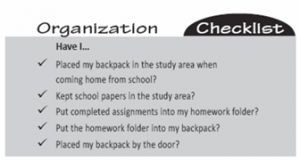Some children are naturally organized while others struggle to maintain any semblance of neatness. The latter are the children who stuff crumpled papers in their backpacks, struggle to keep track of assignments, and don’t get started on long-term projects until the night before. There are ways parents can help — without standing over them night after night. Consider these ideas for helping your disorganized child:
Establish A Homework Area. Setting up a special area, dedicated for homework and relatively free of distractions, helps all children. An elementary and middle school child should have one or two potential study areas that are free and clear of clutter, such as the kitchen table, the dining room table (my favorite), or a home office (on the main level – it’s too hard to monitor homework time if it’s occurring upstairs or in the basement). High school and responsible middle school students can work in any of the above areas or in their rooms, as long as they have a table or desk.
Some students may need access to a computer. However, they can be easily distracted by the internet. Just checking a few emails can turn into an hour of surfing the web and instant messaging with friends. If this has been a concern in the past, but your child genuinely needs computer access in order to type and print work, equip it with word processing software, not an Internet connection. Research can be conducted on a computer in a common area that you are able to periodically monitor.
It is equally important to have school supplies in one central location so that time is not wasted searching here, there, and everywhere for pens, pencils, or paper. Label a shoe box with the child’s name or purchase a caddy in which to keep materials. This way, if the homework location must change for a night or two, supplies are portable.
Create A Dedicated Homework Folder. Research shows that when students have one homework folder for all subjects, they are more likely to turn their work in. When kids do not have one central place to put their completed work, they are more likely to lose it. There is nothing more frustrating for a child then when he knows he finished his homework, but can’t find it in school the next day.
Help your child choose a colorful folder and label one pocket “To Be Completed” and the other “Completed.” Even for young children (who don’t have much homework yet), this step helps them to get in the habit of putting schoolwork in the correct place. When an assignment is given in class, it should be placed in the left pocket, and when it’s finished at home, it goes in the right pocket. Repeat mantra, “Homework isn’t done until it’s in your folder” until this process is automatic.
Post A Checklist – Many kids benefit from a checklist to help them remember where their school materials should be placed. When left to their own devices, some children will throw their backpack any old place, strew their papers across the kitchen table, and leave their completed work on the counter when they do their homework. No wonder they can’t find their homework the next day at school.
Set up a routine for organization, put it in writing, and post it in a conspicuous place so that it serves as a visual reminder. For example, your child’s checklist might look like this:
Give A Bonus For Staying Organized. Giving a bonus is a great incentive for any child. A bonus is a small reward that is above and beyond what the child is already earning for appropriate behavior. A bonus can be given for most any behavior you want to recognize and reward, and it doesn’t have to be used in tandem with a checklist. For example, if you want your child to be packed up and ready for school before he goes to bed, and not at the last moment in the morning, give him a bonus for having all materials in his backpack by 8 pm. In terms of improving organization, consider a bonus for the following: keeping a tidy binder (binder check can be daily, or just once per week); putting completed work into the binder and placing it in the backpack, and keeping the study area neat by cleaning up after homework is done.
A bonus can be anything that is of value to the child, such as additional computer time, a special dessert after dinner, a later bedtime, or a small amount of money in addition to his allowance. Bonuses don’t have to be given daily. In fact, an unexpected bonus is sometimes more meaningful and motivating than expected rewards.
Finally, the key to maintaining organization is to schedule a weekly 20 to 30 minute “Clean Sweep” session. During this maintenance session, your children will be responsible for organizing anything related to school, such as her backpack, binder, and homework area. Many fami¬lies find that Sunday evening is an ideal time to prepare for the week ahead and to get organized. When this meeting is clearly written on the calendar, you’ll have less resistance as it becomes part of the family routine.
When supported with the right strategies and incentives, children can learn to change their disorganized habits. When children are better organized, the after school hours fraught with frustration can be filled with success and harmony.
Ann K. Dolin, M.Ed., is the founder and president of Educational Connections, Inc., a comprehensive provider of educational services in Fairfax, VA and Bethesda, MD. In her new book, Homework Made Simple: Tips, Tools and Solutions for Stress-Free Homework, Dolin offers proven solutions to help the six key types of students who struggle with homework. Numerous examples and easy-to-implement, fun tips will help make homework less of a chore for the whole family. Learn more at anndolin.com or ectutoring.com.



